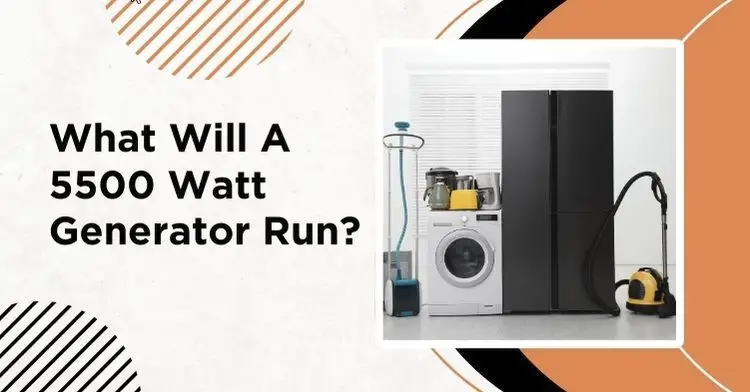What Will A 5500 Watt Generator Run?
When you purchase a 5500-watt generator, you might wonder what will a 5500 watt generator run and which devices can it power? Generally, a generator with a capacity between 5000W and 7000W is suitable for homes ranging from 1200 to 1750 square feet.
A 5500-watt generator is powerful enough to run essential household appliances during a power outage. It can operate items like refrigerators, freezers, air conditioners, lights, fans, and other small appliances. While it’s not the largest generator available, it can meet most of your electricity needs during an emergency.
Contents
- 1 Understanding Generator Power
- 2 Why Choose a 5500-Watt Generator?
- 3 What Will A 5500 Watt Generator Run? Appliances And Devices
- 4 Examples of What You Can Run at the Same Time
- 5 Managing Appliance Loads
- 6 Can a 5500-Watt Generator Run a Water Heater?
- 7 Can a 5500-Watt Generator Run a Welder?
- 8 Generator Runtime and Fuel Efficiency
- 9 Safety Tips for Using a Generator
- 10 Conclusion
Understanding Generator Power
A generator’s wattage indicates the maximum load it can handle. For a 5500-watt generator, this means it can supply up to 5500 watts of power at any given time. However, it’s important to consider both the running (continuous) wattage and the starting (surge) wattage of the appliances you intend to use.
Many appliances require a higher amount of power to start up, known as the starting wattage, and then settle into a lower running wattage. When calculating the total load on your generator, you must account for these higher starting wattages.
Why Choose a 5500-Watt Generator?
- Affordability: It’s typically more affordable than larger models, making it a cost-effective solution for backup power.
- Portability and Noise Level: These generators are often more portable and produce less noise compared to larger generators, making them suitable for residential use.
- Versatility: They can power a wide range of household appliances and tools, providing flexibility during power outages.
What Will A 5500 Watt Generator Run? Appliances And Devices

Here’s a list of common household appliances and their approximate running and starting wattages:
| Appliance | Running Watts | Starting Watts |
| Refrigerator / Freezer | 700W | 2100W |
| Window AC Unit (10,000 BTU) | 1200W | 3600W |
| Microwave Oven | 1000W | 1000W |
| Sump Pump (1/2 HP) | 1050W | 2150W |
| Lights (10 x 60W bulbs) | 600W | 0W |
| Television (LED) | 150W | 0W |
| Laptop Computer | 50W | 0W |
| Washing Machine | 500W | 1500W |
| Coffee Maker | 1000W | 1000W |
| Electric Water Heater (40 Gal) | 4500W | 4500W |
Note: Starting watts account for the initial power surge when turning on an appliance.
Examples of What You Can Run at the Same Time
Scenario 1: Basic Essentials
- Refrigerator/Freezer (Running: 700W, Starting: 2100W)
- Lights (Running: 300W)
- Television (Running: 150W)
- Laptop (Running: 50W)
Total Running Watts: 1200W
Highest Starting Watts: 2100W (from the refrigerator)
Since the total running watts (1200W) and the highest starting watts (2100W) are both within the 5500-watt capacity, you can run these appliances together.
Scenario 2: Adding More Appliances
- Refrigerator/Freezer (Running: 700W, Starting: 2100W)
- Window AC Unit (Running: 1200W, Starting: 3600W)
Total Running Watts: 1900W
Highest Starting Watts: 3600W (from the AC unit)
The combined starting watts (3600W) plus the running watts of other appliances should not exceed 5500W. In this case, you may need to start the AC unit first, then the refrigerator, to manage the starting loads.
Managing Appliance Loads
To effectively use your 5500-watt generator:
- Prioritize Essential Appliances: Decide which appliances are most important during a power outage.
- Stagger Start Times: Start appliances with high starting wattage one at a time to avoid exceeding the generator’s capacity.
- Monitor Total Wattage: Keep track of the total running wattage to ensure it stays within the generator’s limit.
Can a 5500-Watt Generator Run a Water Heater?
Electric water heaters typically have heating elements rated around 4500 watts. Running a water heater alone would consume most, if not all, of the generator’s capacity, leaving little room for other appliances. Therefore, it’s generally not practical to run a standard electric water heater with a 5500-watt generator while powering other devices.
Can a 5500-Watt Generator Run a Welder?
Most welders require significant power, often exceeding the capacity of a 5500-watt generator. For example, a typical stick welder might require 9000W to 12,000W. While some small inverter welders may operate on lower power, it’s important to:
- Check the Welder’s Specifications: Ensure the welder’s power requirements are within the generator’s capacity.
- Avoid Equipment Damage: Running a welder on a generator that cannot supply sufficient power can damage both the welder and the generator.
Generator Runtime and Fuel Efficiency
A 5500-watt generator’s runtime depends on its fuel tank size and the load it’s powering. For example:
- Fuel Tank Capacity: If the generator has a 6.1-gallon gasoline tank.
- Runtime at 50% Load: It might run for about 9 hours.
Factors Affecting Runtime:
- Load Level: Higher loads consume more fuel.
- Fuel Type: Gasoline, propane, and diesel have different efficiencies.
- Generator Efficiency: Engine design impacts fuel consumption.
Safety Tips for Using a Generator
- Operate Outdoors Only: Use the generator in a well-ventilated area to prevent carbon monoxide poisoning.
- Keep Dry: Protect the generator from rain and moisture.
- Avoid Overloading: Do not exceed the generator’s rated capacity.
- Use Proper Extension Cords: Use heavy-duty, outdoor-rated cords that match the generator’s output.
- Install a Transfer Switch: If connecting to your home’s electrical system, have a transfer switch installed by a qualified electrician.
- Regular Maintenance: Follow the manufacturer’s guidelines for oil changes and upkeep.
Can I run my whole house on a 5500-watt generator?
Not entirely. You can run essential appliances but not everything at once.
Is it safe to run sensitive electronics on a generator?
Use a generator with a low Total Harmonic Distortion (THD) or use a UPS/surge protector to safeguard your electronics.
How loud is a 5500-watt generator?
Noise levels vary, but they typically produce around 70 decibels, similar to a vacuum cleaner.
How do I store my generator when it’s not in use?
Store your generator in a dry, sheltered area to protect it from the elements. Make sure it’s clean and dry before storing, and consider using a generator cover to keep dust and moisture away.
Conclusion
A 5500-watt generator can power essential household appliances during a power outage, helping you maintain comfort and safety. By understanding your appliances’ power requirements and managing your generator’s load, you can effectively use your generator without exceeding its capacity. Always prioritize safety by following proper usage guidelines and performing regular maintenance.
If you want to know How much can a 7500 watt generator run, read our article.

